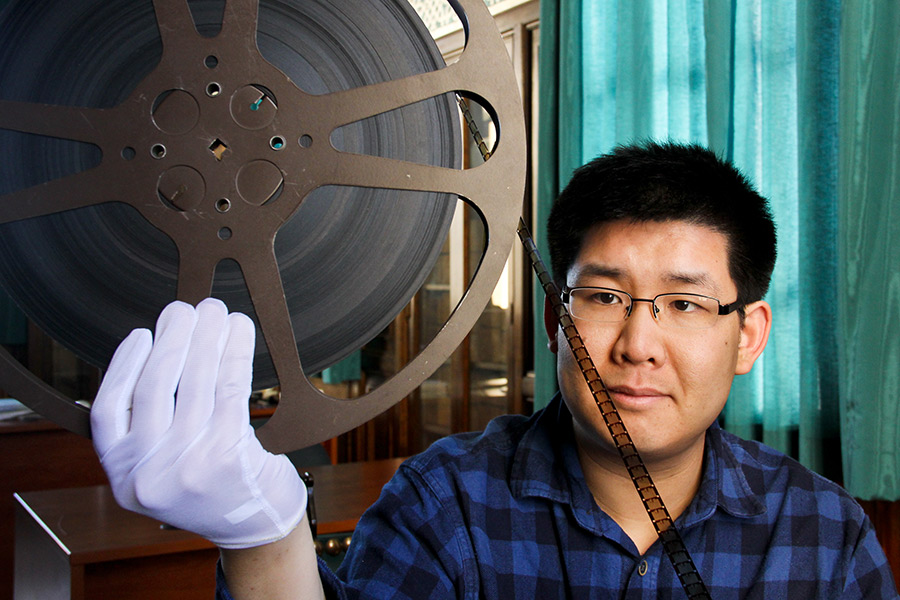Faculty Profile: Joseph Ho
The historian with a passion for photography makes sure his classes are far more than snapshots of dates and facts, but a “human experience.”

For Dr. Joseph Ho, assistant professor of history, the personal and professional are intrinsically linked.
His teaching and research focus on photographs and films in modern East Asia across the 19th and 20th centuries. It’s a fascination that stems from personal roots. “It comes down to encountering photos and stories while growing up,” Ho explains. “My parents are immigrants, now naturalized, and I think about how these images tell a story about experiences that are fading away.” He says he wants to “recover some of those stories from East Asia and Chinese or Chinese American lives that I encountered in the images from my family.”
This fascination with images has spilled over into an interest in the making of them. Ho collects and restores historically significant cameras and has more than 150 of them. Among his favorites are German-made Rolleiflex twin-lens-reflex cameras, internationally popular from the 1930s through the 1970s.
It is the same kind of camera that his paternal grandfather used in the 1950s. “That camera was stolen from my family after a disastrous earthquake in Taiwan years ago, and we’ve never been able to find it,” says Ho. This familial loss led to a deep desire to understand how photography, history and personal memories intersect.
Ho’s students get the opportunity to use his restored cameras to create photographs of their own. This hands-on approach is exemplary of Ho’s teaching style. He says he felt inspired to teach after connecting with excellent mentors while getting his undergraduate degree at the University of California, San Diego.
One of these mentors stood out to Ho because of his lively approach to teaching, more akin to a liberal arts setting than a large research university. “The way that he taught was just like he was having a conversation with you,” Ho describes. “He was engaging the students in this personal conversation about history and literature that made the topics come alive. I try to replicate that in the kind of teaching that I do.”
Another inspiration was the stories themselves. “It was a lifelong desire to be able to share these stories about history, about Asia, about historical experience in ways that were understandable to a wider audience,” Ho says. “I think about it as show and tell. I’ve always loved show and tell, and I’m happy to keep doing it every single day.”
In Between Worlds
Ho went on to earn a Ph.D. in history from the University of Michigan, specializing in global history, cultural history and visual culture. Modern Chinese history, in particular, intrigues Ho because of its richness and complexity. It also connects to his own identity. “My personal history is tied up with the complexities of how Chinese history and East Asian history encounter American history and American experience,” he says.
Ho calls it “in-betweenness,” adding, “a lot of these histories exist in between different kinds of personal and communal experience, and the evolving questions of belonging that come with them. Like what it means to be Chinese. What it means to be an American, and what it means to be an Asian American. It’s all about in-betweenness.” This is a concept Ho’s students write papers about, and it is the driving force behind his research.
When outside the classroom, Ho keeps busy. He has traveled to China, Taiwan, Japan and Germany. His newest book will be released in January 2022 by Cornell University Press. He works with colleagues at the University of Michigan and other institutions to preserve newly discovered collections of historical material for future scholars.
Along with being an avid photographer, he enjoys biking and playing the violin and piano. And, just as his photographic interests overlap with his teaching, the piano does, too: Ho screens a 1922 Chinese silent film in his classes, and plays the piano for his students as a period-appropriate musical accompaniment.
The students always get a kick out of it, he says. “History is far more than a dry collection of dates and facts,” Ho explains. “History is human experience.”